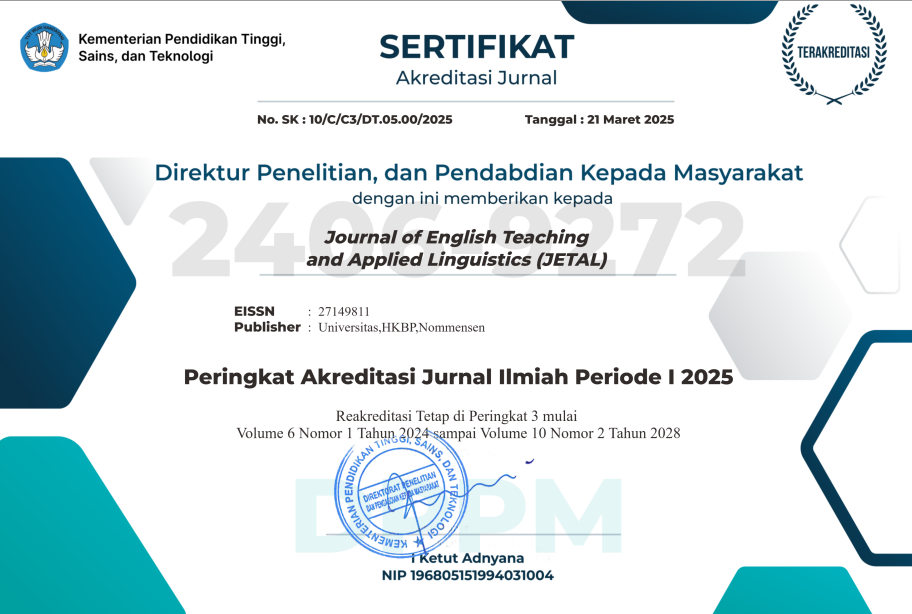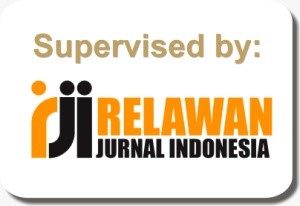Global Research Trends of Role-play Method in English Language Teaching: A Bibliometric Analysis
Abstract
This study examines global research trends, thematic development, and prospective directions of the role-play method in English Language Teaching (ELT) from 2000 to 2025 via an extensive bibliometric analysis. 81 Scopus-indexed publications were methodically chosen based on established inclusion and exclusion criteria. The analysis, conducted using VOSviewer and Bibliometrics (Biblioshiny), indicated substantial post-pandemic growth in publications, propelled by incorporating digital assessment, task-based learning, and online communicative methodologies. The results indicate a thematic shift in role-play from an auxiliary technique to a fundamental educational strategy associated with 21st-century skills. Furthermore, international collaboration networks and theme clusters underscore the method’s versatility across educational and cultural settings. This study presents theoretical, methodological, and practical contributions, offering significant insights for researchers, educators, and policymakers in the dynamic English Language Teaching (ELT) field.
References
Aria, M., & Cuccurullo, C. (2017). bibliometrix: An R-tool for comprehensive science mapping analysis. Journal of Informetrics, 11(4), 959–975. https://doi.org/10.1016/j.joi.2017.08.007
Biynazarova, N., Abdimomunova, A., Dzhilkibaeva, N., Takenova, Z., & Asanova, D. (2024). The Use of Interactive Techniques, Role-Playing Games, and Dramatization to Increase Linguistic Creativity and Motivation of Students. Jurnal Arbitrer, 11(3), 360 – 372. https://doi.org/10.25077/ar.11.3.360-372.2024
Busse, V., & Krause, U.-M. (2016). Instructional methods and languages in class: A comparison of two teaching approaches and two teaching languages in the field of intercultural learning. Learning and Instruction, 42, 83 – 94. https://doi.org/10.1016/j.learninstruc.2016.01.006
Choi, S. H., & Sinwongsuwat, K. (2024). Vlogging: An Alternative to Role-play in Improving EFLearners’ Conversation Skills. REFLections, 31(2), 353 – 385. https://doi.org/10.61508/refl.v31i2.273312
Donthu, N., Kumar, S., Mukherjee, D., Pandey, N., & Lim, W. M. (2021). How to conduct a bibliometric analysis: An overview and guidelines. Journal of Business Research, 133, 285–296. https://doi.org/10.1016/j.jbusres.2021.04.070
Gil, V., & Dueñas, P. M. (2023). Designing and Implementing a Professional Programme for ICLHE Teachers: Beyond Linguistic and Communicative Competence. Journal of Language Teaching and Research, 14(4), 1013–1022. https://doi.org/10.17507/jltr.1404.19
Hamad, M. M. (2013). Factors negatively affect speaking skills at Saudi colleges for girls in the south. English Language Teaching, 6(12), 87 – 97. https://doi.org/10.5539/elt.v6n12p87
Herman Safar, Basri, I. Y., Nasir, M., & Setiawan, M. Y. (2023). Pengaruh variasi Berat Rumah Kopling Sentrifugal Terhadap Torsi dan Daya Sepeda Motor Honda Beat FI Tahun 2019. JTPVI: Jurnal Teknologi Dan Pendidikan Vokasi Indonesia, 1(3), 319–324. https://doi.org/10.24036/jtpvi.v1i3.34
Hiver, P. (2013). The interplay of possible language teacher selves in professional development choices. Language Teaching Research, 17(2), 210 – 227. https://doi.org/10.1177/1362168813475944
Jackson, J. (2002). Reticence in second language case discussions: Anxiety and aspirations. System, 30(1), 65 – 84. https://doi.org/10.1016/S0346-251X(01)00051-3
Kebritchi, M., Hirumi, A., & Bai, H. (2010). The effects of modern mathematics computer games on mathematics achievement and class motivation. Computers and Education, 55(2), 427 – 443. https://doi.org/10.1016/j.compedu.2010.02.007
Khasawneh, M. A. S. (2024). A Look at the impacts of the application of collaborative technologies in foreign language teaching; Insights from lecturers. Research Journal in Advanced Humanities, 5(3). https://doi.org/10.58256/mtpah596
Klimova, B. (2021). An insight into online foreign language learning and teaching in the era of COVID-19 pandemic. Procedia Computer Science, 192, 1787–1794. https://doi.org/10.1016/j.procs.2021.08.183
Li, X., Yang, Z., Chen, S., & Ma, S. (2021). Research on A Machine Scoring Method of Role-Play Section in English Oral Test. In G. X., H. G., C. J., C. J., & D. K. (Eds.), ACM International Conference Proceeding Series (pp. 380 – 386). Association for Computing Machinery. https://doi.org/10.1145/3498851.3498983
Little, D. (2005). The Common European Framework and the European Language Portfolio: Involving learners and their judgements in the assessment process. Language Testing, 22(3), 321 – 336. https://doi.org/10.1191/0265532205lt311oa
Liu, Y. (2025). Philosophical Insights into Intercultural Communicative Competence: Cultural Value Transmission from Curriculum Design to Classroom Practice in English Education. Cultura. International Journal of Philosophy of Culture and Axiology, 22(1), 480 – 497. https://www.scopus.com/inward/record.uri?eid=2-s2.0-85208946891&partnerID=40&md5=c37c3d30427b42b561c8f477b6192fca
Marion, G. S., Hildebrandt, C. A., Davis, S. W., Marín, A. J., & Crandall, S. J. (2008). Working effectively with interpreters: A model curriculum for physician assistant students. Medical Teacher, 30(6), 612 – 617. https://doi.org/10.1080/01421590801986539
Moosa, S., Shareefa, M., & Hammad, A. (2025). Boosting Fluency and Confidence: The Impact of Role-Play Activities on Speaking Skills of ESL Learners. International Journal of Literacies, 32(1), 21 – 34. https://doi.org/10.18848/2327-0136/CGP/v32i01/21-34
Morales, R., Rodriguez, L., Singh, A., Stratta, E., Mendoza, L., Valerio, M. A., & Vela, M. (2015). National Survey of Medical Spanish Curriculum in U.S. Medical Schools. Journal of General Internal Medicine, 30(10), 1434 – 1439. https://doi.org/10.1007/s11606-015-3309-3
Namanyane, T., & Shaoan, M. M. R. (2025). English teachers’ pedagogical content knowledge in the implementation of learner-centered role-play: a case study of curriculum and policy reforms in China. Cogent Education, 12(1). https://doi.org/10.1080/2331186X.2025.2488073
Phoeun, M., & Sengsri, S. (2021). The effect of a flipped classroom with communicative language teaching approach on undergraduate students’ English speaking ability. International Journal of Instruction, 14(3), 1025 – 1042. https://doi.org/10.29333/iji.2021.14360a
Pinzl, M. M. (2024). Non-scripted role-playing with heritage speakers and second language learners in the medical interpreting classroom. Translation and Translanguaging in Multilingual Contexts, 10(2), 206 – 235. https://doi.org/10.1075/ttmc.00134.pin
Rodis, O. M. M., & Locsin, R. C. (2019). The implementation of the Japanese Dental English core curriculum: Active learning based on peer-teaching and learning activities. BMC Medical Education, 19(1). https://doi.org/10.1186/s12909-019-1675-y
Seltzer, K. (2019). Performing Ideologies: Fostering Raciolinguistic Literacies Through Role-Play in a High School English Classroom. Journal of Adolescent and Adult Literacy, 63(2), 147 – 155. https://doi.org/10.1002/jaal.966
Suryani, L. (2015). Efektivitas Metode Role Play dalam Meningkatkan Keterampilan Berbicara Bahasa Inggris Siswa. Jurnal Pendidikan Bahasa, 2(1), 35–44.
Thomson, H. (2024). Improving Classroom Teaching and Learning of Multi-Word Expressions for Conversational Use Through Action Research with Learner Feedback. Languages, 9(11). https://doi.org/10.3390/languages9110336
Tsai, C.-C., & Piamsai, C. (2025). The Use of Peer Assessment and Non-Scripted Role-Play Activities in Improving Thai EFL High School Students’ English Oral Performance. REFLections, 32(1), 126 – 153. https://doi.org/10.61508/refl.v32i1.279180
Tsareva, E., Gulnaz, F., & Murtazina, E. (2020). Developing students’ intercultural competence during the professional oriented course in english as a foreign language. In C. A., A. G.R., & R. T. (Eds.), IEEE Global Engineering Education Conference, EDUCON (Vols. 2020-April, pp. 1110 – 1114). IEEE Computer Society. https://doi.org/10.1109/EDUCON45650.2020.9125182
Williyan, A., Fitriati, S. W., Pratama, H., & Sakhiyya, Z. (2024). AI as CO-CREATOR: EXPLORING INDONESIAN EFL TEACHERS’ COLLABORATION With AI in CONTENT DEVELOPMENT. Teaching English with Technology, 24(2), 5 – 21. https://doi.org/10.56297/vaca6841/LRDX3699/RZOH5366
Zupic, I., & Čater, T. (2015). Bibliometric methods in management and organization. Organizational Research Methods, 18(3), 429–472. https://doi.org/10.1177/1094428114562629

This work is licensed under a Creative Commons Attribution-ShareAlike 4.0 International License.
Authors retain copyright and grant the journal right of first publication with the work simultaneously licensed under a Creative Commons Attribution-ShareAlike 4.0 International License (CC BY-SA 4.0) that allows others to share the work with an acknowledgment of the work's authorship and initial publication in this journal.
Authors are able to enter into separate, additional contractual arrangements for the non-exclusive distribution of the journal's published version of the work (e.g., post it to an institutional repository or publish it in a book), with an acknowledgment of its initial publication in this journal.
Authors are permitted and encouraged to post their work online (e.g., in institutional repositories or on their website) prior to and during the submission process, as it can lead to productive exchanges, as well as earlier and greater citation of published work (See The Effect of Open Access).





